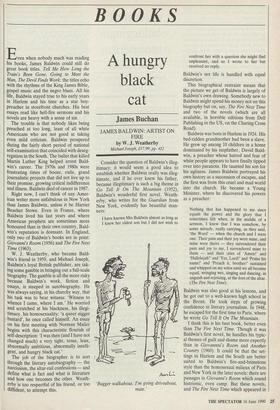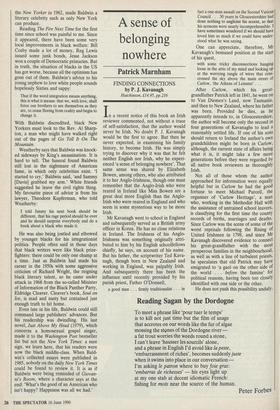BOOKS
A hungry black cat
James Buchan
JAMES BALDWIN: ARTIST ON FIRE by W. J. Weatherby
Michael Joseph, f17.99, pp. 412
Even when nobody much 'was reading his books, James Baldwin could still do great book titles. Tell Me How Long the Train's Been Gone, Going to Meet the Man, The Devil Finds Work: the titles echo
with the rhythms of the King James Bible, gospel music and the negro blues. All his life, Baldwin stayed true to his early years in Harlem and his time as a star boy- preacher in storefront churches. His best essays read like hell-fire sermons and his novels are heavy with a sense of sin.
The trouble is that nobody likes being preached at too long, least of all white Americans who are not good at taking even mild criticism. Baldwin prospered during the fairly short period of national self-examination that coincided with deseg- regation in the South. The bullet that killed Martin Luther King helped arrest Bald- win's career. The 1970s and 1980s were frustrating times of booze, exile, grand journalistic projects that did not live up to their promise, growing critical indifference and illness. Baldwin died of cancer in 1987.
Right now, I can't think of any Amer- ican writer more unfabulous in New York than James Baldwin, unless it be Harriet Beacher Stowe. Even in France, where Baldwin lived his last years and where American prophets are sometimes more honoured than in their own country, Bald- win's reputation is dormant. In England, only two of Baldwin's books are in print: Giovanni's Room (1956) and The Fire Next Time (1963).
W. J. Weatherby, who became Bald- win's friend in 1959, and Michael Joseph, Baldwin's loyal British publisher, are tak- ing some gamble in bringing out a full-scale biography. The gamble is all the more risky because Baldwin's work, fiction and essays, is steeped in autobiography. He was always saying, in his churchy way, that his task was to bear witness: 'Witness to whence I came, where I am.' He worried and scratched at his blackness, his illegi- timacy, his homosexuality: 'a queer nigger bastard', he once called himself. An essay on his first meeting with Norman Mailer begins with this characteristic flourish of self-description: 'I was then (and I have not changed much) a very tight, tense, lean, abnormally ambitious, abnormally intelli- gent, and hungry black cat.' The job of the biographer is to sort through the literary autobiography — the narcissism, the altar-rail confessions — and define what is fact and what is literature and how one becomes the other. Weath- erby is too respectful of his friend, or too diffident, to attempt this.
Consider the question of Baldwin's illeg- itimacy: it would seem a good idea to establish whether Baldwin really was illeg- itimate, and if he ever knew his father, because illegitimacy is such a big theme in Go Tell It On The Mountain (1952), Baldwin's wonderful first novel. Weath- erby, who writes for the Guardian from New York, evidently has beautiful man- ners:
I have known Mrs Baldwin almost as long as I knew her eldest son but I did not wish to
'Bugger walkabout, I'm going driveabout, mate.'
confront her with a question she might find unpleasant, and so I wrote to her but received no reply.
Baldwin's sex life is handled with equal discretion.
This biographical restraint means that the picture we get of Baldwin is largely of Baldwin's own drawing. Somebody new to Baldwin might spend his money not on this biography but on, say, The Fire Next Time and two of the novels (which are all available, in horrible editions from Dell Publishing in the US, on the Charing Cross Road).
Baldwin was born in Harlem in 1924. His bed-ridden grandmother had been a slave. He grew up among 10 children in a home dominated by his stepfather, David Bald- win, a preacher whose hatred and fear of white people appears to have finally tipped over into paranoia. He taunted his son for his ugliness. James Baldwin portrayed his own history as a succession of escapes, and the first was from this cruel and mad world into the church. He became a Young Minister, where he discovered his powers as a preacher: Nothing that has happened to me since equals the power and the glory that I sometimes felt when, in the middle of a sermon, I knew that I was somehow, by some miracle, really carrying, as they said, 'the Word' — when the church and I were one. Their pain and their joy were mine, and mine were theirs — they surrendered their pain and joy to me, I surrendered mine to them — and their cries of 'Amen!' and `Hallelujah!' and 'Yes, Lord!' and 'Praise his name!' and `Preach it, brother!' sustained and whipped on my solos until we all became equal, wringing wet, singing and dancing, in anguish and rejoicing, at the foot of the altar. (The Fire Next Time).
Baldwin was also good at his lessons, and he got out to a well-known high school in the Bronx. He took steps of growing confidence in literary journalism. In 1948, he escaped for the first time to Paris, where he wrote Go Tell It On The Mountain.
I think this is his best book, better even than The Fire Next Time. Though it was Baldwin's first novel, he handles his typic- al themes of guilt and shame more expertly than in Giovannni's Room and Another Country (1960). It could be that the set- tings in Harlem and the South are better suited to Baldwin's fire-and-brimstone style than the homosexual milieux of Paris and New York in the later novels: there are passages in Giovanni's Room which sound histrionic, even camp. But these novels, and The Fire Next Time which appeared in the New Yorker in 1962, made Baldwin a literary celebrity such as only New York can produce.
Reading The Fire Next Time for the first time since school was painful to me. Since it appeared, there have been some very local improvements in black welfare: Bill Cosby made a lot of money, Reg Lewis issued some junk bonds, Jesse Jackson won a couple of Democratic primaries. But in truth, the situation of blacks in the US has got worse, because all the optimism has gone out of them. Baldwin's advice to his young nephew to love white people sounds hopelessly Sixties and sappy:
That if the word integration means anything, this is what it means: that we, with love, shall force our brothers to see themselves as they are, to cease fleeing from reality and begin to change it.
With Baldwin discredited, black New Yorkers must look to the Rev. Al Sharp- ton, a man who might have walked right out of the pages of Go Tell It On The Mountain.
Weatherby says that Baldwin was knock- ed sideways by King's assassination. It is hard to tell. The funeral found Baldwin still lost in the nightmare of American fame, in which only celebrities exist. `I started to cry,' Baldwin said, `and Sammy [Davis] grabbed my arm.' White friends suggested he leave the civil rights thing. My favourite piece of advice is from his lawyer, Theodore Kupferman, who told Weatherby: I told Jimmy his next book should be different, that his rage period should be over and he should surprise everybody and do a book about a black who made it.
He was also being jostled and elbowed by younger blacks for his integrationist politics. People often said in those days that black writers were like black prize- fighters: there could be only one champ at a time. Just as Baldwin had made his career in the 1950s with some aggressive criticism of Richard Wright, the reigning black literary talent, so he came under attack in 1968 from the so-called Minister of Information of the Black Panther Party, Eldridge Cleaver. Cleaver's book, Soul on Ice, is mad and nasty but contained just enough truth to hit home.
Even late in his life, Baldwin could still command large publishers' advances. But his readership was dwindling. His last novel, Just Above My Head (1979), which concerns a homosexual gospel singer, made it to the Washington Post bestseller list but not the New York Times: a sure sign, we learn here, that his readers were now the black middle-class. When Bald- win's collected essays were published in 1985, nobody on the daily New York Times could be found to review it. It is as if Baldwin were being reminded of Giovan- ni's Room, where a character says at the end: 'What's the good of an American who isn't happy? Happiness was all we had.'



















































 Previous page
Previous page